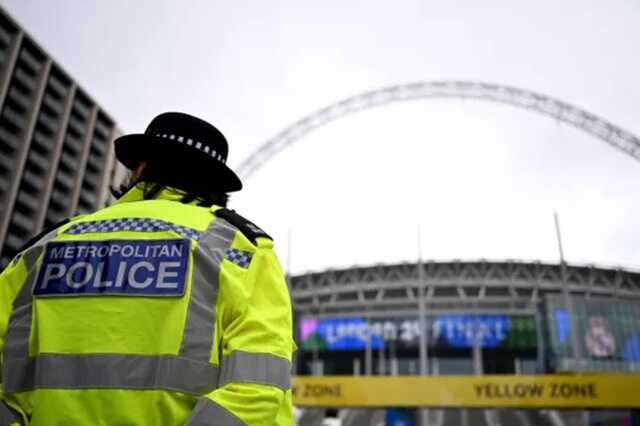
The Metropolitan Police isn’t the best at policing, apparently, according to inspectors.
An information pack given to prospective police officers says the Met is responsible for ‘maintaining the peace and is accountable in law for the exercise of policing powers’.
But London’s force wasn’t graded ‘outstanding’ or ‘good’ at all by His Majesty’s Inspectorate of Constabulary and Fire & Rescue Services (HMICFRS) across eight key policing areas.
In his report for the 2023-25 period, published today, chief inspector Lee Freeman found the Met is performing well below the basic standards expected in seven areas.
He gave the Met’s crime investigating and offender management the lowest rating of ‘inadequate’.
Scotland Yard ‘requires improvement’ when it comes to preventing crime, responding to the public, protecting vulnerable people, developing a positive workplace and its leadership and force management.

London’s police unit didn’t rank anywhere above ‘adequate’ (Picture: HMICFRS)
Only the way the Met used police powers and treated the public was rated ‘adequate’ by the inspectorate, which scrutinises emergency services.
‘The inspectorate said that the force had improved its response to the public and that the majority of 999 and 101 calls are now answered quickly,’ HMICFRS said.
‘But inspectors found significant issues in the standards of investigations and care for victims, particularly in those offences allocated to local teams.
‘They said that the force must improve the quality and supervision of its investigations to ensure better outcomes for victims.
‘The management of offenders and suspects was also a serious concern, with inconsistencies and delays seen.’
London has long been rocked by more crime compared to other towns and cities in Britain. The overall crime rate in the capital as of June is 88 crimes per 1,000 people, according to the tracking website CrimeRate.
But inspectors found the Met has an ‘inexperienced workforce’, whether it be rank-and-file officers or their supervisors, trying to manage workloads ‘beyond their training and knowledge’.
The police service’s ‘culture makes some officers and staff reluctant to speak out about poor behaviour’, it added, echoing an independent report last year that described the Met as a ‘boy’s club’.
Other findings included almost one in five visits to sex offenders being overdue.
Inspectors did, however, praise the department’s use of stop-and-search, calling the practice ‘both fair and effective’ and that ‘the overwhelming majority of recorded grounds for stop-and-search were reasonable’.
Freeman stressed that as much as Met officials are working to transform the force in the wake of drooping public support and scandals, all part of its two-year ‘A New Met for London’ plan, change is slow.
The Met has also said it is scaling back its reform plans due to a funding gap of £92million this year.
‘While I commend the force for the progress it has made in answering the public’s calls quickly, I have serious concerns about how the force is currently investigating crime and how it manages offenders and suspects,’ Freeman said.
‘I am aware that before our inspection, the force had already recognised the need to achieve better outcomes for victims.
‘However, these plans have not yet led to consistent improvements across the whole force, and more work needs to be done to make sure that this happens.’
The inspector’s report only adds to the already long list of woes of the troubled Met Police. Last year, a report labelled one of the world’s oldest police forces as institutionally sexist, misogynistic, racist and homophobic.
The report, compiled by House of Lords member Louise Casey, was ordered after the murder of Sarah Everard by a Met police officer in 2021. It came only a year after the Independent Office for Police Conduct, the police watchdog, made more than a dozen recommendations for how to reform the department.
The Met was put into special measures – called ‘Engage’ – in 2022.
Trust in the Met has also steadily chipped over time. A BBC poll last year of 1,000 Londoners found that 42% ‘strongly’ or ‘somewhat’ distrust the Met.
In a statement on X, the Met Police said officials are using ‘every available resource to deliver more trust, less crime and high standards for London’.
The Met is using every available resource to deliver more trust, less crime and high standards for London. @HMICFRS’ PEEL report underlines why our continuing reform is needed.
— Metropolitan Police (@metpoliceuk) August 15, 2024
???? | Read our statement pic.twitter.com/6Lv8Jftuua
‘HMICFRS’ report underlines why this continuing reform is needed. ONS data shows that confidence in the Met is above other big cities and overall crime in London is below them,’ it said.
‘It is positive to see the Inspectorate agree A New Met for London is the right plan to deliver improvements and that we are making progress.
‘Since this inspection took place, we have already agreed a plan to move forward from the enhanced HMICFRS monitoring (known as ‘Engage’).
‘We are now reflecting carefully on the findings, the core of which reflect our A New Met for London plans and the briefing we gave to the HMIC.
‘We will continue to work closely with the Inspectorate, the Mayor’s Office for Policing and Crime, and other partners to improve delivery for Londoners.’
Read more similar news:
Comments:
comments powered by Disqus

































